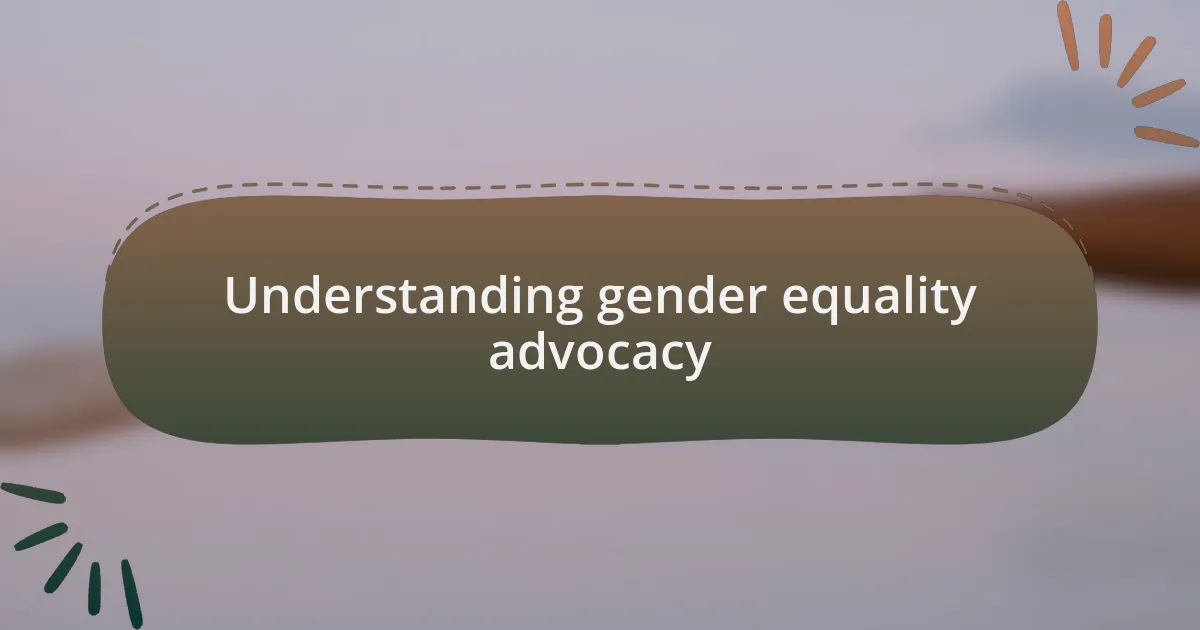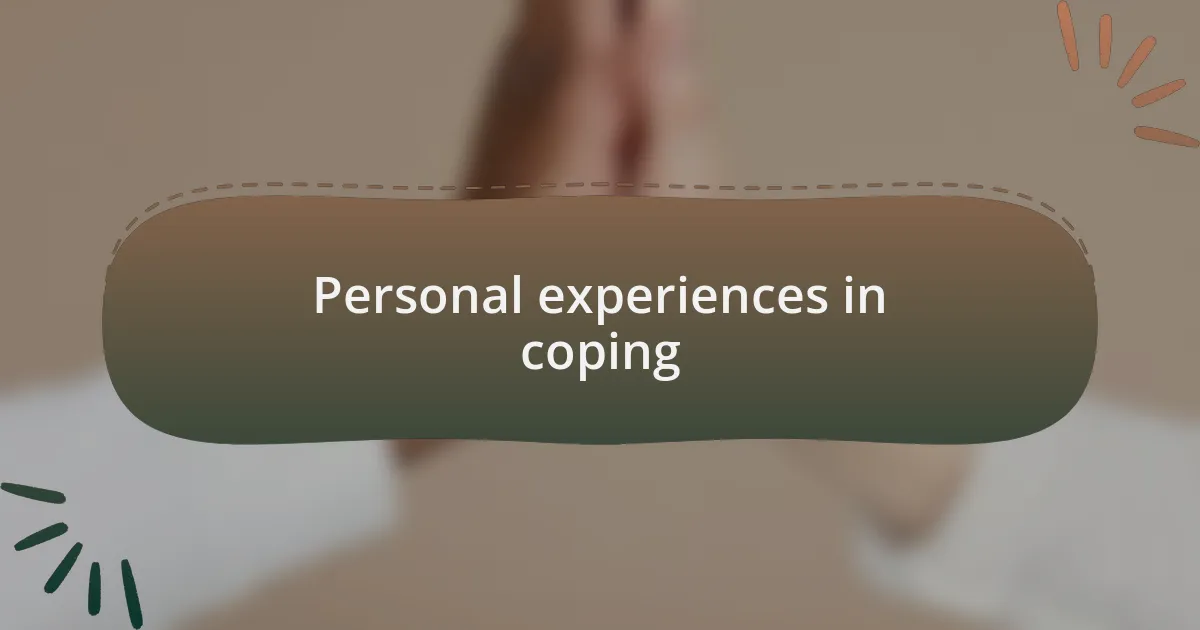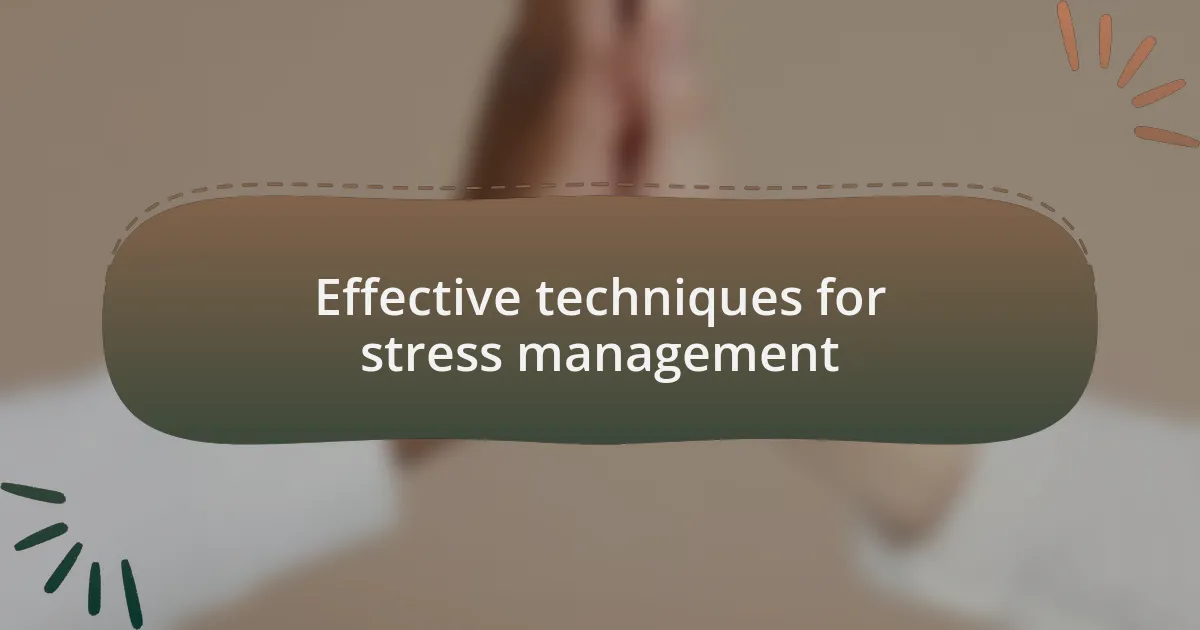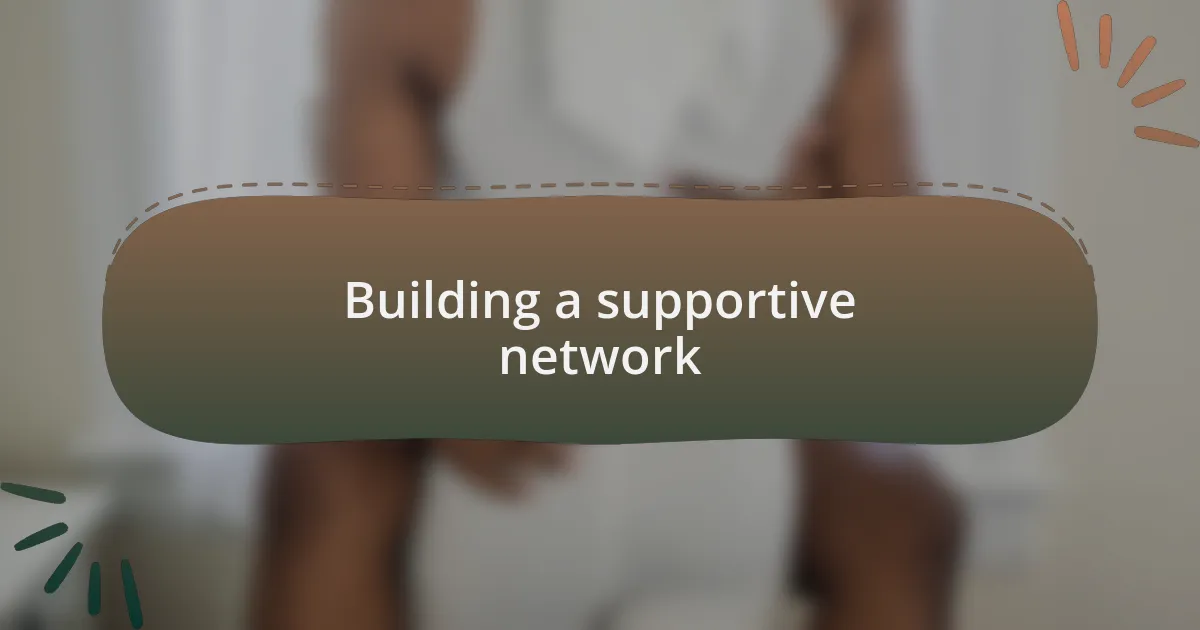Key takeaways:
- Gender equality advocacy involves challenging ingrained biases and creating inclusive spaces for diverse voices.
- Coping strategies, such as self-care and community support, are essential for sustaining passion and effectiveness in advocacy work.
- Building a supportive network enhances resilience and fosters collaboration, driving innovative solutions in advocacy efforts.
- Sharing coping strategies through open conversations can empower others and strengthen community connections among advocates.

Understanding gender equality advocacy
Gender equality advocacy is more than just a movement; it’s a collective journey towards creating a world that recognizes and values the contributions of all genders. I often find myself reflecting on how moments of everyday life illustrate these disparities. For instance, I remember a discussion with a friend who shared her experience of being overlooked for a promotion due to the perception that she was less committed because of her family obligations. This scene quietly yet powerfully encapsulates the essence of advocacy—challenging these ingrained biases requires courage and teamwork.
In my advocacy work, I’ve come to understand that achieving gender equality is about addressing systems that have long favored one gender over others. Think about it: when was the last time you noticed a decision being made that didn’t consider diverse voices? These moments, whether in the workplace or at a community meeting, highlight the gaps we need to address. Personally, after witnessing these dynamics, I realized that advocating for change isn’t just about speaking out; it’s about creating spaces for all voices to be heard and recognized.
Ultimately, understanding gender equality advocacy requires a deep dive into not only the statistics but also the stories that propel us into action. I remember attending a workshop where an inspiring speaker shared how their life had been shaped by inequality, and it reminded me that the roots of advocacy lie in our shared experiences. When we engage with these poignant narratives, we foster empathy and connection, making our call for action not just a necessity, but a shared vision for a fairer future.

Importance of coping strategies
Coping strategies are essential for managing the emotional toll that advocacy work can often impose. I remember a time when I found myself feeling overwhelmed after attending a particularly intense meeting on gender disparities. In reflecting on that experience, I realized that taking a step back to practice self-care was not just beneficial; it was necessary for maintaining my passion and effectiveness in advocating for change.
Effective coping strategies empower individuals to navigate the complexities that arise in gender equality advocacy. I’ve come to appreciate the value of joining support groups where we share both frustrations and victories. By opening up about our journeys, we not only lighten our emotional burdens but also reinforce our commitment to the cause. Isn’t it fascinating how connecting with others can rejuvenate our spirit and drive us forward?
Moreover, implementing coping strategies can enhance our resilience when faced with setbacks. I often remind myself that advocacy is a marathon, not a sprint. Having practices in place—such as journaling my thoughts or engaging in mindfulness exercises—helps ground me during tough times. What methods do you employ to bounce back when the road gets rocky? Finding what works for you is key to sustaining your advocacy journey and ensuring your voice remains strong and impactful.

Common challenges in advocacy work
Advocacy work isn’t without its hurdles. I recall a time when I poured hours into a campaign that didn’t gain the traction I’d hoped for. It’s disheartening to invest so much effort, only to face apathy or opposition. Those moments often raise questions: Why does it feel like my voice isn’t being heard? Learning to navigate that frustration has been a journey in itself.
Sometimes, I find myself wrestling with competing priorities. Balancing advocacy with daily responsibilities can be overwhelming. There have been days when I felt stretched thin, torn between attending a crucial meeting and fulfilling personal obligations. This constant pull can lead to burnout. How do we ensure that our passion for advocacy doesn’t overshadow other important aspects of our lives?
In addition, I’ve observed that encountering resistance—whether from individuals or systems—can be tough. Reflecting on a time when I faced pushback during a panel discussion, I felt the weight of my words. I wondered if my ideas were being dismissed simply because of my identity. It’s this reality that often demands emotional resilience. How can we maintain our tenacity in the face of such challenges? Building a supportive network has been instrumental for me, as it offers strength in vulnerability and a reminder that we’re not alone in our quest for equality.

Personal experiences in coping
Coping during tough times in advocacy has led me to seek solace in community. I remember a period when I felt isolated, grappling with the weight of criticism. It was during a small gathering of fellow advocates that I realized how powerful shared experiences can be. Listening to their stories not only validated my feelings but also reminded me that resilience often blossoms from camaraderie. Have you ever felt a lift in spirit just by connecting with someone who understands your struggle?
There are moments when self-care becomes essential to my ability to cope. I didn’t always prioritize my mental health, but I learned the hard way the impact of neglecting it. One evening, after a particularly challenging day, I decided to take a long walk in nature. The quiet and beauty around me recharged my spirit. It was a revelation: taking the time to pause not only benefits me but directly influences how effectively I advocate for others. Isn’t it fascinating how stepping away for a moment can bring clarity to our mission?
Sharing my journey has also been a powerful coping mechanism. I started writing a blog to reflect on my advocacy experiences, and it has been liberating. By laying my thoughts bare, I invite others into my world, fostering meaningful conversations. There’s something therapeutic about articulating struggles and triumphs. It makes me question, how many of us recognize the healing power of our own stories? Each entry not only serves as a form of release but also connects me with readers who find solace in shared struggles.

Effective techniques for stress management
Finding effective stress management techniques has been a transformative journey for me. During high-pressure moments in advocacy, I discovered that deep breathing exercises could ground me. I vividly remember the day a heated debate left me feeling overwhelmed. I took a few minutes to close my eyes and focus on my breath, feeling the tension melt away with each exhale. Isn’t it amazing how something so simple can restore our calm in the chaos?
Another technique that has proven valuable is establishing boundaries. There was a time when I felt compelled to respond to every email and message immediately. This constant connectivity drained my energy and created unnecessary stress. I learned that prioritizing my time meant allocating specific hours for advocacy work and dedicating other moments for rest. Have you ever noticed how saying “no” can free up space for a better “yes” later on?
Engaging in creative outlets has also played a significant role in my stress management arsenal. Whether it’s painting, journaling, or even dancing in my living room, these activities offer me an escape. One unforgettable evening, I spent hours creating art that reflected my frustrations and hopes. The process was cathartic, turning heavy emotions into vibrant expression. How often do we overlook the power of creativity to heal our spirits? Each brushstroke or written word becomes a step toward finding balance within myself amidst the demands of advocacy.

Building a supportive network
Building a supportive network is an essential lifeline in the often turbulent waters of advocacy work. I recall the moment I confided in a fellow advocate about my struggles with burnout. Her empathetic response was a turning point for me, illustrating how sharing our challenges can create profound connections. Have you considered how vulnerability can draw people closer, fostering a community of support?
Over time, I’ve learned the importance of surrounding myself with individuals who uplift and inspire. Joining local advocacy groups and attending workshops has introduced me to powerful allies. I can still remember the camaraderie I felt during a recent event, where ideas flowed freely, and encouragement permeated the atmosphere. It’s incredible how a supportive circle can ignite motivation; don’t you think everyone deserves to feel that sense of belonging?
In my experience, building a supportive network goes beyond just having people around; it’s about the quality of those relationships. I’ve found immense strength in collaborations that challenge my thinking and push me to grow. For instance, when a colleague and I tackled a joint project, our shared brainstorming sessions led to innovative solutions I couldn’t have reached alone. Isn’t it fascinating how collaboration not only nurtures our goals but also helps us evolve as advocates?

Sharing coping strategies with others
When it comes to sharing coping strategies, I’ve found that open conversations can be transformative. I vividly remember a discussion with a mentor who shared her techniques for managing stress, like journaling and guided meditation. Learning about her journey made me realize that sharing these strategies can illuminate paths for others facing similar challenges—have you thought about what insights you could offer to someone who’s struggling?
Engaging in peer support sessions has also been a game changer for me. During one meeting, I observed how my colleagues leaned on each other, exchanging practical tips on balancing advocacy work and personal life, which often feels like an uphill battle. I felt a surge of gratitude seeing how a simple space for dialogue could empower us all—doesn’t it feel amazing to realize we’re not alone in our struggles?
I cherish moments when I can facilitate workshops that focus on coping strategies, where everyone gets to voice their experiences and ideas. Recently, after sharing my approach to setting boundaries, someone mentioned how that insight resonated with her journey. This exchange not only fostered a collaborative environment but also reinforced the belief that our collective experiences can serve as invaluable resources—how often do we underestimate the power of shared wisdom?